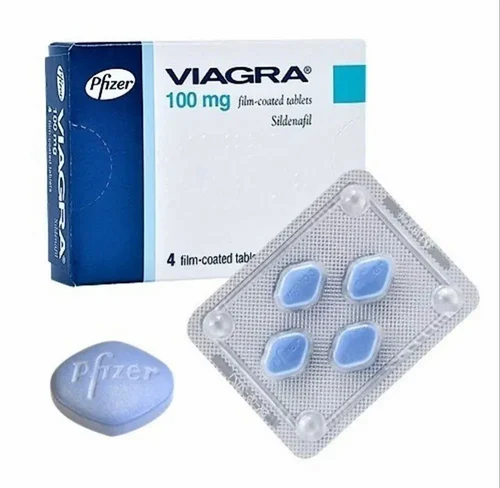Viagra, known generically as sildenafil, is a medication used primarily to treat erectile dysfunction (ED) in men. It is also used under different brand names for treating pulmonary arterial hypertension (PAH). Here’s an overview of Viagra, including its uses, side effects, and other important information:
Uses
- Erectile Dysfunction (ED): Viagra is commonly prescribed to help men with ED achieve and maintain an erection sufficient for sexual activity. It works by increasing blood flow to the penis in response to sexual stimulation.
- Pulmonary Arterial Hypertension (PAH): Under the brand name Revatio, sildenafil is used to treat PAH, a condition characterized by high blood pressure in the arteries of the lungs. It helps to relax and widen the blood vessels in the lungs, improving exercise capacity and reducing symptoms.
How It Works
Viagra works by inhibiting an enzyme called phosphodiesterase type 5 (PDE5), which leads to increased levels of cyclic guanosine monophosphate (cGMP). This results in the relaxation of smooth muscles and increased blood flow to certain areas of the body, such as the penis, leading to an erection in response to sexual stimulation.
Dosage and Administration
- Forms: Viagra is available in oral tablet form, typically in strengths of 25 mg, 50 mg, and 100 mg.
- Dosage: The typical starting dose is 50 mg taken about 1 hour before sexual activity. Based on efficacy and tolerability, the dose may be adjusted to a maximum of 100 mg or decreased to 25 mg. The medication should not be taken more than once daily.
- Administration: Viagra should be taken orally, with or without food. Taking it with a high-fat meal may delay its onset of action.
Side Effects
Common side effects may include:
- Headache: One of the most common side effects.
- Flushing: Redness or warmth in the face, neck, or chest.
- Indigestion: Gastrointestinal discomfort or heartburn.
- Nasal Congestion: Stuffiness or runny nose.
- Dizziness: May affect balance and coordination.
Serious side effects can include:
- Priapism: A prolonged and painful erection lasting more than 4 hours, which requires immediate medical attention to prevent permanent damage.
- Vision Changes: Sudden vision loss or changes, including seeing a blue tint to objects.
- Hearing Loss: Sudden decrease or loss of hearing, sometimes accompanied by ringing in the ears.
- Heart Attack Symptoms: Chest pain, nausea, or discomfort, especially if experienced during or after sexual activity.
Warnings and Precautions
- Drug Interactions: Viagra can interact with certain medications, including nitrates (used for chest pain) and some other blood pressure medications, which can cause a dangerous drop in blood pressure. Inform your healthcare provider of all medications you are taking.
- Medical Conditions: Use with caution in individuals with cardiovascular conditions, severe liver or kidney disease, or a history of stroke. It should not be used in men for whom sexual activity is inadvisable due to cardiovascular risk.
- Pregnancy and Breastfeeding: Viagra is not intended for use in women, and its safety in pregnancy and breastfeeding is not established.
Considerations
- Efficacy: Viagra requires sexual stimulation to be effective. It does not cause an erection without sexual arousal.
- Alcohol: Excessive alcohol consumption can impair the effectiveness of Viagra and increase the risk of side effects.
Safe Use
- Follow Prescriptions: Use Viagra exactly as prescribed by your healthcare provider. Do not exceed the recommended dose or frequency.
- Avoid Nitrates: Do not use Viagra with nitrates or other medications that can cause a significant drop in blood pressure.
Withdrawal and Discontinuation
- Discontinuation: Viagra does not cause physical dependence or withdrawal symptoms, so it can be discontinued without tapering. However, regular follow-up with a healthcare provider is important to manage the underlying condition.
If you experience severe side effects, signs of an allergic reaction, or symptoms of overdose (such as severe dizziness, fainting, or prolonged erection), seek medical attention immediately. Regular follow-up with your healthcare provider is essential to monitor the medication’s effectiveness and address any potential side effects.


Reviews
There are no reviews yet.